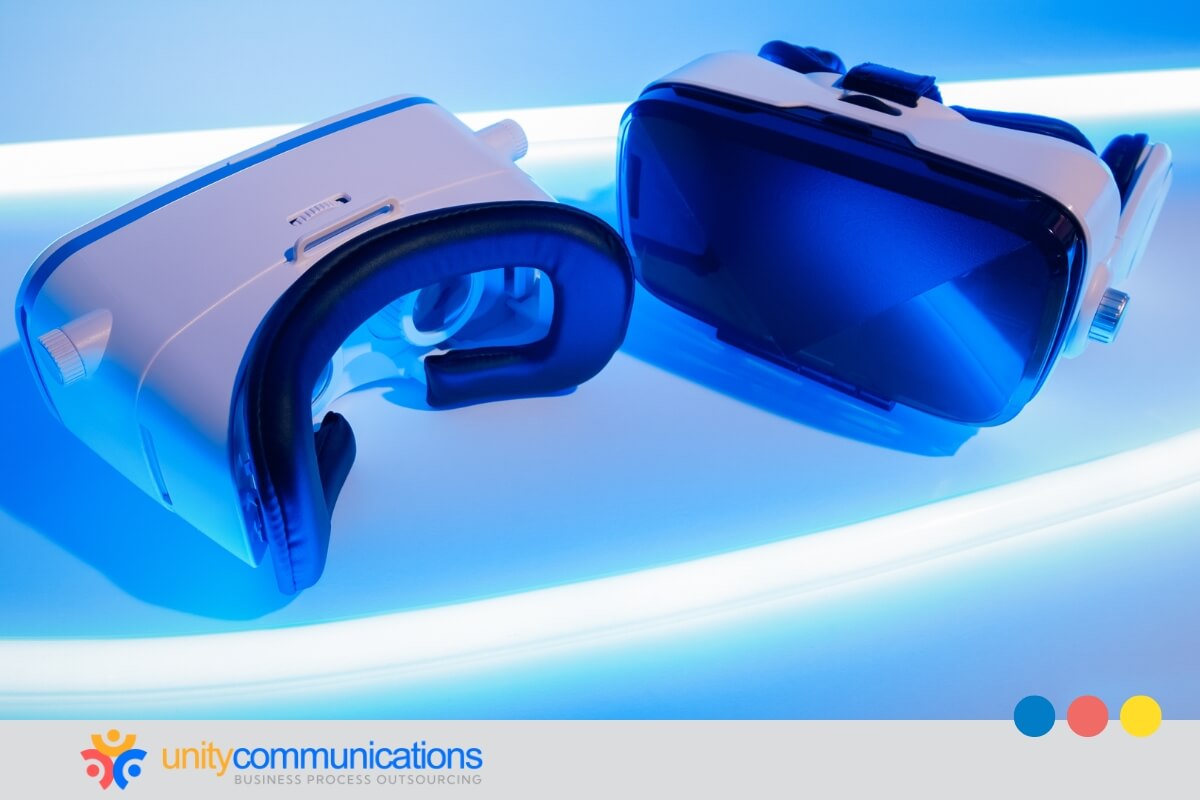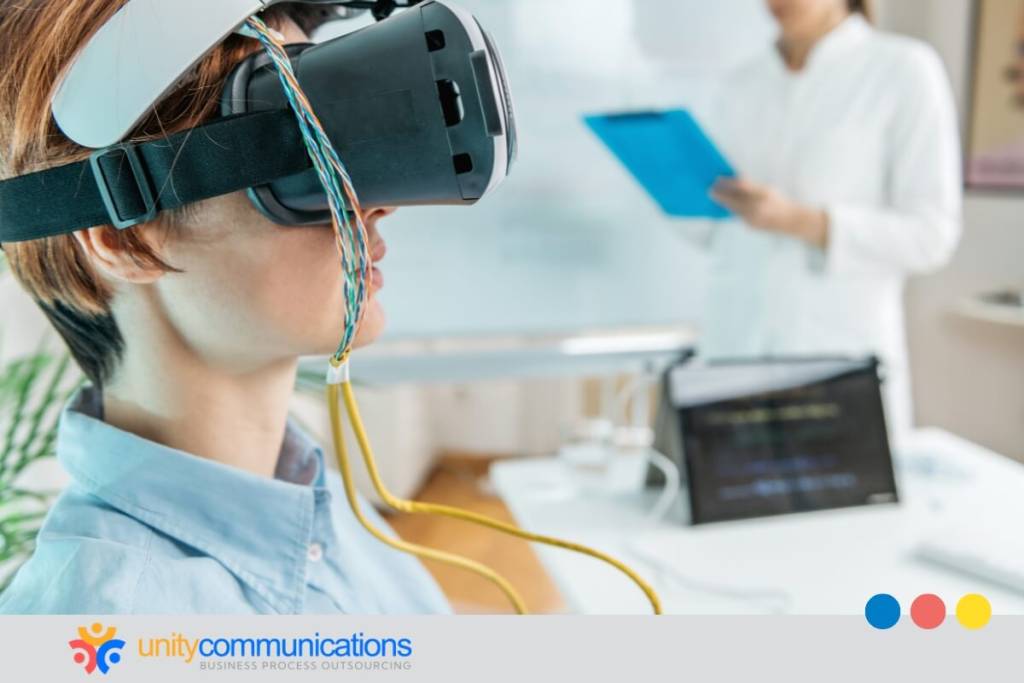IN THIS ARTICLE
Table of Contents
The rise of virtual reality (VR) in corporate training has transformed how organizations approach learning and development (L&D). VR training increases engagement and knowledge retention while decreasing training time, all in a safer and more cost-effective way.
Business process outsourcing (BPO) plays a pivotal role in this transformation by designing, implementing, and managing immersive training experiences that enhance employee performance and engagement.
This article explores the benefits of utilizing BPO in virtual reality training programs. Keep reading!
BPO’s role in virtual reality training programs

Employers must regularly train their workforce to develop skills and ensure regulatory compliance. However, the global shift to remote and hybrid work has made traditional in-person upskilling more difficult.
Virtual reality (VR) training programs can help employers provide an immersive and flexible learning solution for remote and hybrid work environments. VR enables employees to engage in realistic, hands-on training without needing on-site presence, making it ideal for upskilling and compliance training.
Through VR simulations, employees can train in a safe, controlled environment, which improves retention and boosts confidence in applying skills in real-world scenarios. Research by PwC revealed that VR learners are four times faster to train than in a traditional classroom and 275% more confident in applying skills after training.
But what is BPO? How can training and development managers, human resource (HR) leaders, and corporate strategists leverage this solution in VR training?
BPO is the practice of contracting external firms to manage specific functions. For companies, this means outsourcing the development, implementation, and integration of virtual reality training programs to specialized BPO firms.
Read on to learn more about BPO’s role in VR training.
Designing customized VR training modules
BPO companies can customize VR training modules to meet the specific needs of various industries. Organizations can tap into extensive expertise in instructional design and digital content creation by outsourcing VR content development. BPO teams can craft immersive learning experiences that cater to diverse needs, from onboarding to advanced skills training.
Moreover, BPO providers offer the flexibility to align virtual reality training programs to the organization’s unique goals and compliance standards. Whether the focus is on soft skills, technical training, or safety procedures, BPO firms can develop VR experiences that mirror real-world challenges employees face in their roles.
Creating immersive learning experiences with VR content
Immersive learning is at the heart of VR training, providing employees with hands-on experience in a risk-free environment. BPO companies help design these experiences by developing interactive 3D simulations that allow employees to practice and refine their skills.
Whether employees are learning how to operate machinery or improve customer service, immersive VR content offers a more engaging and effective learning process. With their expertise in content creation, BPO teams can develop immersive experiences tailored to an organization’s needs.
Managing VR training program logistics and deployment
Deploying a VR training program requires careful planning and logistical management, especially for larger organizations. BPO companies handle the end-to-end process, from sourcing and setting up VR equipment to coordinating training schedules and managing deployment timelines.
Outsourcing these tasks to a BPO organization frees internal resources, allowing L&D teams to focus on strategic objectives rather than operational logistics. Moreover, the scalability of BPO services ensures that VR deployment can adapt as the organization grows or expands its training needs.
Utilizing analytics to measure VR training effectiveness
BPO companies also play a critical role in tracking and analyzing the effectiveness of virtual reality training programs. They use advanced analytics tools to monitor employee progress, engagement, and knowledge retention. Companies can track key performance indicators (KPIs) such as completion rates, engagement levels, and post-training performance.
With BPO companies improving analytical capabilities, organizations can gather insights to fine-tune training strategies. This fosters a culture of informed decision-making in learning and development.
Optimizing costs in VR training
One key advantage of leveraging BPO for virtual reality training programs is its significant cost savings. Developing VR training requires substantial investments in technology and personnel. Companies can reduce these costs by leveraging third-party resources.
BPO firms can develop and implement virtual reality training programs at a fraction of the cost of in-house operations. Moreover, they offer flexible pricing models that allow organizations to scale VR training initiatives as needed. These make BPO a cost-effective solution for businesses of all sizes.
Enhancing employee engagement with VR training
Employee engagement is crucial to any training program’s success, and VR effectively improves this aspect. BPO companies help enhance engagement by designing interactive, gamified VR modules that keep employees motivated throughout the learning process.
Facilitated by BPO companies, VR training helps foster engagement by creating memorable, impactful learning experiences beyond what traditional and e-learning methods could offer.
Integrating VR technology into corporate training
Integrating VR technology into corporate training requires seamless content, software, and hardware coordination. BPO firms simplify this process by acting as intermediaries between organizations and VR technology providers.
They ensure the smooth integration of VR platforms into existing learning management systems (LMS), minimizing disruptions while enhancing the training experience. The streamlined approach allows businesses to adopt VR solutions without overburdening internal teams.
As VR adoption continues to grow, with the global market expected to reach $44.7 billion by 2024, BPO companies are essential in helping organizations keep pace with technological advancements. Beyond integration, providers ensure training programs are future-proof, scalable, and adaptable to industry needs.
Collaborating with VR developers to innovate training content
Finally, BPO companies collaborate closely with VR technology developers to innovate training content and stay ahead of industry trends. In the process, training programs incorporate the latest advancements, from enhanced graphics to more sophisticated interactivity.
As the demand for innovative training solutions increases, these partnerships will be invaluable in implementing relevant and effective training experiences. They foster continuous innovation in corporate training, empowering organizations to adapt to the changing needs of their workforce.
The bottom line

VR is revolutionizing the way organizations approach learning and development. By partnering with BPO providers, companies can implement immersive, scalable, and cost-effective virtual reality training programs. BPO companies offer end-to-end services, from designing tailored VR content to managing deployment logistics and integrating advanced analytics.
As the demand for more innovative, flexible, and impactful training solutions grows, BPO providers are critical in keeping organizations ahead of the curve. From enhancing employee engagement to driving cost savings, BPO-driven VR training programs are a robust investment in the future of workforce development.
Ready to elevate your training strategy? Let’s connect!





